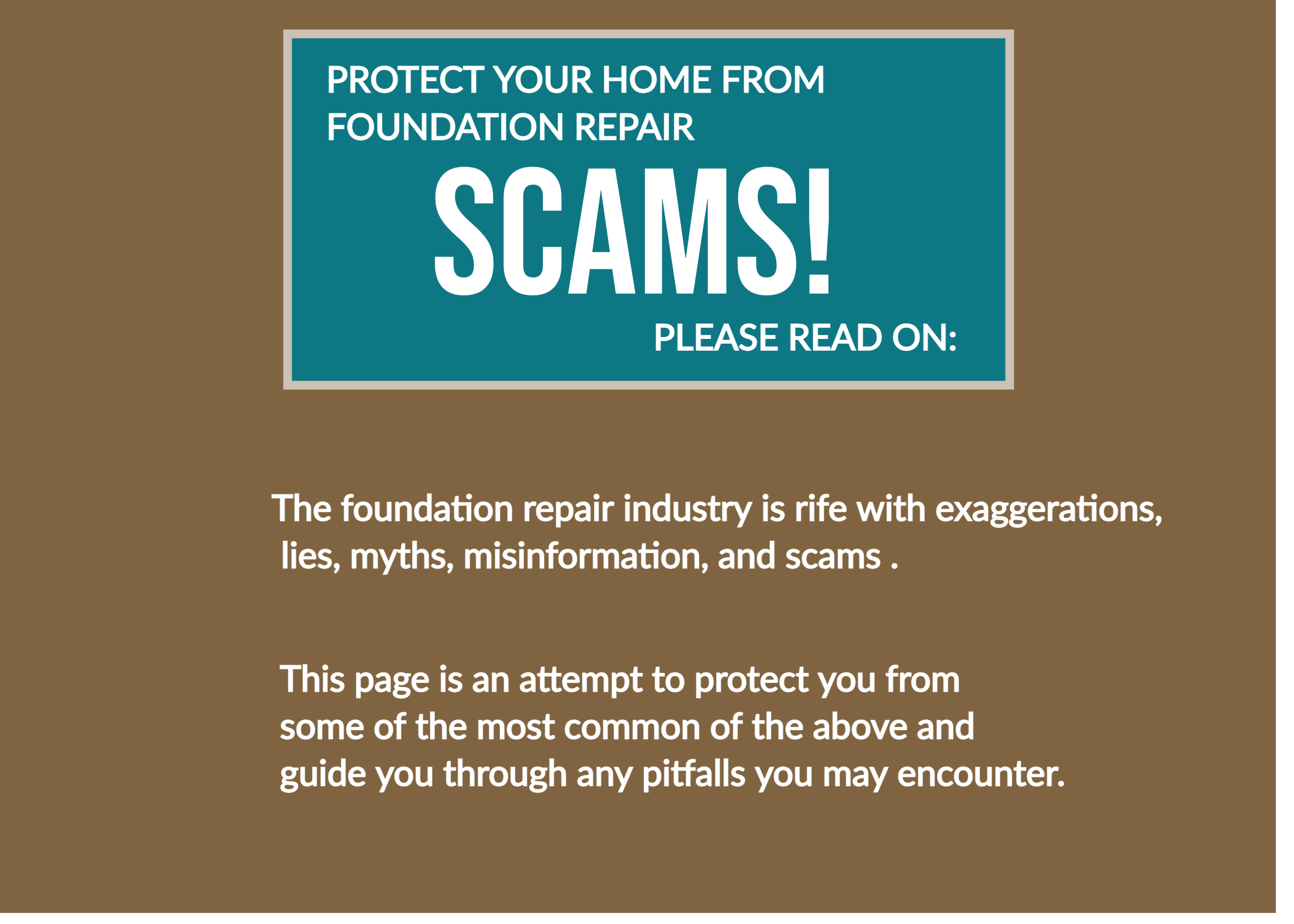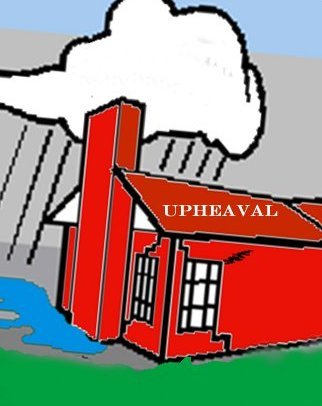
![7-asnakeoil[1]](https://repairfoundations.com/wp-content/uploads/2021/10/7-asnakeoil1.png)
It seems that North Texas and surrounding areas have become the center of foundation repair scams for the entire country.
I understand there are over two hundred and fifty foundation repair companies operating in Texas. While I don’t doubt the number it would be extremely hard to document an exact count.
FACT: Far and away, the most foundation-damaged homes result from upheaval—swelling soils that are not corrected by piers and lifting.
FACT: Foundation companies pop up, come and go, change names, change owners, and disappear almost daily!
FACT: All it takes is a pickup truck, a couple of laborers, and you too can be a foundation repair contractor. That is scary. It's easy to be misled by media advertising and low prices! (See next fact!)
FACT: The state of Texas, along with many others, does not license or provide oversight of foundation repair companies!
FACT: Most foundation repair agents are commissioned pier salespeople paid to sell as many piers as possible!
FACT: Many engineers who specialize in residential foundation repair are "in bed" with foundation repair companies! (The pier salesman specifies the job, and the engineer rubber-stamps it, or the engineer specifies and then directs the customer whom to use.)
FACT: Foundation elevations, when conducted without a benchmark and original elevation data from construction time, are misleading and unreliable. Without a proper reference point, accurate determination of foundation settlement or heaving is impossible. Using any level tool, unless referenced to a benchmark like sea level, only indicates floor levelness. Results can be manipulated to show settlement or heaving, depending on the chosen zero point. In short, without precise baseline measurements, these readings are essentially useless and may lead to incorrect conclusions about foundation condition.
FACT: Lifting and piering the lower part of a structure that has heaved will likely fail once the heaved areas dry out.
FACT: Most foundation warranties primarily protect contractor interests rather than customers. Typically, these warranties only cover vertical pier settlement over a lifetime, rather than ensuring overall repair success. Consequently, structures often continue moving, even if piers settle, failing to provide customer relief.
FACT: Many foundation repair contracts in North Texas include clauses mandating arbitration for dispute resolution, rather than pursuing legal action. During arbitration, contract and warranty terms are reviewed, often resulting in dismissal of claims where issues like upheaval contributed to repair failure (as mentioned above).
These points highlight the challenges customers may face with foundation repair warranties and contract terms in North Texas.
I can walk you through these issues. If you question any of the above contact me and I will be happy to explain it in more detail AND explain how to deal with it.

Over forty years in foundation repair business
FACT: I have been involved with the foundation repair business for forty years. I have seen foundation repair scams come and go. Often leaving a trail of failed foundation repairs and unhappy customers. The point is, there are a lot of pier salesmen and consequently a lot of scams.

Richard Rash in pier hole 1981
ANOTHER FACT: The number one foundation repair scam or fraud is just plain misinformation!
Due to the pier salesmen lies many people believe most foundation failures are the result of droughts after construction. This is basically not true! Droughts before and during construction can be the beginning of a chain of events that lead to foundation movement and damage but is not usually the trigger.
The trigger comes when the soil shrinks before or during construction, then after the foundation is poured the rains come and soils swell, triggering foundation movement and causing damage to sheet rock, door and window frames, brick siding, hard floor covering and other elements of the structure.
The reason it works this way is concrete is not usually poured in wet or expanded soil , so soil shrinking enough to cause structural problems would be extremely unlikely after the build.
Dry pre-construction soils/drought is likely to cause foundation movement down the line. Foundations poured during a drought are likely to experience swelling soils as time goes by.
Contributing to the problem is that we have basically been in a series of droughts, off and on since the 1930’s and since concrete should not be poured in wet soil, most foundations have been. and continue to be poured during hot weather which is conducive to dry and shrunken or contracted soil.
If our areas was not so hilly the movement would not be so wide spread.
When rains come, soils on the high side of the structure are more likely to retain water and swell than soils on the down side, where the water runs off. When the soils expand unevenly the twisting occurs.
Proper preventive foundation drainage can alleviate much of the movement and can prevent additional movement by avoiding the need for the soils to dry out and lose volume.
When you understand that foundation problems, while numerous, do not affect the majority of buildings in our area, it makes sense that those constructed on hilly terrain, with foundations poured in hot weather are the leading candidates for foundation problems and the leading candidates for proper preventive foundation drainage.
Piers, while useful under certain conditions such as damage from earthquakes, sinkholes, mudslides and other events where soil is lost from under a structure, are not by any means a cure all for most foundation issues in Texas or other areas of expansive soils.
In other words, proper preventive foundation drainage is usually the best way to prevent, stop or reverse foundation damage. By limiting soils expansion after initial rains, and in turn, limiting soil contracting as the ground dries, there is less pressure on the foundation which equals less chance of the foundation moving.
This will mean less chance of signs of foundation damage, which means less likely need for piers, which means a better, less expensive and longer lasting resolution to the problem of foundation movement and damage in areas of expansive soils.
Contractors don't pour foundations when the ground is wet!

The problem for the pier salesman
FACT: If the homeowner knows the soil under his home has heaved, then it only makes sense to let the soil dry. It will most always come back down naturally, to near original grade. This can take a year or more before you should even consider piers or remodeling. At that point usually, the need for piers is gone.
When that happens there goes the salesman’s commission check. Bottom line: foundations fail for many reasons and usually, in areas of expansive soils, that does not mean that they need piers. In rare occasions they do, but as a rule they do not.
FACT: Foundation companies thrive selling piers, strong pier salesmen make a good living selling piers, and are trained to sell piers, many times when piers are not the least expensive option, best option or even a viable option, it’s just the only option that makes them money.

Satire of foundation repair salesman.
More Facts:
Areas that would be included in scams, frauds and omissions which I would be happy to explain:
- No foundation contractor licensing or oversight in Texas.
- Using arbitration in contracts to prevent the customer from suing the contractor.
- Warranties written to protect the contractor more than the customer.
- The use of scam elevations to determine if you need piers.
- Engineers rubber stamping contractor bids for a fee and referring contractors in return.
- Lack of standardized pricing for piers.
- Cities using permits as a form of taxation as opposed to consumer protection.
- Foundation companies changing names and owners to avoid unhappy customers reports.
Helping my customers understand and avoid these and other scams, frauds and omissions are a part of my service. It is my mission! Contact me to see how I can help you.
Call/Text Richard: 817-308-8186 or email: richardrashinc@tx.rr.com
FACTS:
I charge a fee...a very reasonable fee!
But: If I can't help you, you don't pay me!
When I do help, you will be glad to pay me!
Click Below ForMy Fees:
https://repairfoundations.com/my-fee-the-best-investment-you-can-make-in-your-foundation/
To Sign up for my occasional newsletter with tips on preventing, stopping and reversing Foundation Damage!
Richard Rash, The Foundation Man. Call/Text: 817-308-8186 email: richardrashinc@tx.rr.com